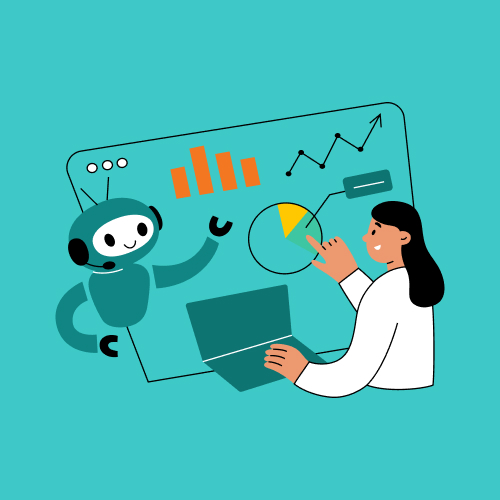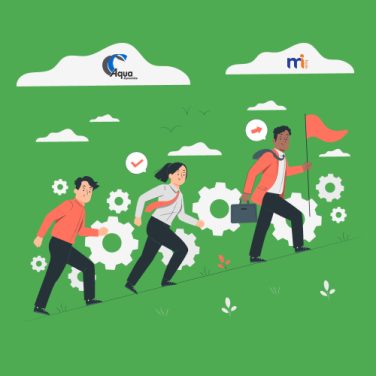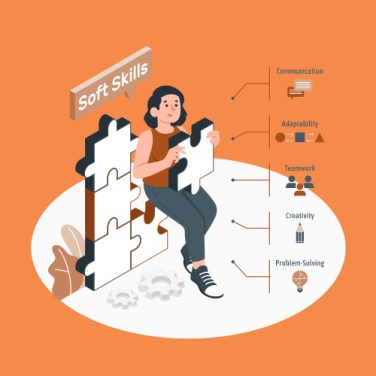The integration of Artificial Intelligence (AI) into Human Resources is transforming how organisations operate, with AI not only automating mundane tasks but also paving the way for more strategic roles within HR.
These advancements are evident in the way HR processes are evolving from traditional methodologies to AI-driven approaches. By adopting technologies like MiHCM’s suite of products, businesses can leverage AI to boost the efficiency of HR tasks such as recruitment, employee engagement, and data analytics.
Studies and applications in the realm of AI in HR are multifaceted. They cover the automation of routine processes, the enhancement of recruitment efficiencies, and the improvement of strategic decision-making through data analytics.
Here we delve into case studies and research papers that highlight the substantial benefits AI brings to HR management and illustrates future trends poised to redefine the industry.
Revolutionising operational efficiency

The integration of AI in HR management is revolutionising various processes, marking a shift towards greater efficiency and precision.
One of the significant benefits is the improvement in operational efficiency.
AI-powered solutions automate repetitive and time-consuming tasks like sorting resumes, scheduling interviews, and processing employee benefits, allowing HR professionals to focus on more strategic activities.
With the inclusion of real-time data analytics through AI, HR departments can make better-informed decisions. These advancements provide actionable insights drawn from vast amounts of data, helping organisations to forecast trends, understand productivity patterns, and tailor strategies to improve workforce engagement.
For example, MiHCM’s HR Analytics and Data & AI turn people data into gold by diving deep into HR data, revealing diversity and productivity patterns that lead to better hiring practices.
Moreover, AI enhances recruitment processes by identifying best-fit candidates more efficiently.
AI algorithms can analyse vast quantities of applicant data to highlight those who align closely with the job requirements, thus reducing hiring time and improving the quality of hires. This application of AI in HR not only streamlines recruitment but also contributes to lower turnover rates by ensuring a better match between job roles and candidates.
The implementation of AI across HR systems assures a refined approach to managing human resources, evident in the increased effectiveness of recruitment, enhanced decision-making capabilities, and an overall boost in departmental efficiency.
Case study overview
Let’s examine the application of AI in HR within a mid-sized technology firm. The organisation aimed to enhance its HR functionality by integrating AI solutions into its existing processes. This case study explores its journey towards AI-driven efficiency, highlighting the challenges faced, solutions implemented, and outcomes achieved.
- Objective: The primary goal was to automate repetitive HR tasks to free up resources for strategic initiatives and improve recruitment processes.
- Implementation: The company employed AI tools to automate routine workflows and derive actionable insights from its HR data. These tools helped in effective hiring and onboarding by automating the preliminary screening of CVs and scheduling interviews.
- Challenges: Initial obstacles included resistance from HR teams concerned about job displacement and data security risks. To address these, comprehensive training sessions and data security enhancements were introduced.
- Solution: Integration of AI was approached incrementally. By allowing HR staff to focus on strategic roles, AI tools demonstrated their capability to enhance productivity.
- Outcomes: The deployment led to significant improvements in HR workflow efficiencies. Analytics identified potential skills gaps within the organisation, presenting opportunities for targeted employee development.
- Efficiency gains: A noticeable reduction in time taken to complete routine tasks unlocked a 30% boost in recruitment efficiency. There was a reduction in turnover due to better matching of candidates to roles.
This case study signifies the pivotal role AI can play in transforming HR by facilitating smarter decision-making and streamlining operations. As organisations harness the power of AI, they reveal enormous potential for improved workforce management and efficiency gains.
AI’s transformative potential
Real-world examples of AI’s impact on HR efficiency underscore its transformative potential.
A notable case study is that of a large international company that turned to AI to uplift its HR operations. The HR department faced inefficiencies with manually processing thousands of job applications per week, often resulting in delayed recruitment decisions and increased employee turnover.
By implementing an AI-powered recruitment platform, it optimised its talent acquisition process. Key processes that benefited from automation included:
- Application screening: AI algorithms rapidly sorted through resumes, identifying the top talent based on predefined criteria. This reduced the application review time by 70%.
- Interview scheduling: Automated scheduling tools allowed for seamless coordination between candidates and HR panels, speeding up the interview process.
- Candidate matching: AI-powered analytics ensured that shortlisted candidates were well-suited to the company’s culture and role, improving employee retention rates.
The measurable outcomes of these implementations were significant. The recruitment cycle time decreased by 50%, leading to a faster onboarding of qualified candidates. Additionally, the cost per hire was reduced by 30%, demonstrating substantial financial savings for the company.
This case study highlights the effectiveness of AI in enhancing HR efficiency. By deploying state-of-the-art AI tools, it not only streamlined its recruitment process but also achieved greater accuracy in hiring decisions. These improvements reflect a broader trend where AI-driven analytics and automation are crucial for strategic advancements in HR management.
The use of AI in HR, as exemplified by this case, illustrates the numerous benefits in transforming operations, ultimately leading to a more productive and satisfied workforce.
AI in candidate screening
AI tools are rapidly transforming the recruitment landscape by injecting unprecedented efficiency and accuracy into candidate screening and selection processes.
Algorithms powered by AI are capable of sifting through vast amounts of applicant data to identify the best-fit candidates with remarkable speed. This capability significantly enhances the application of AI in HR, as it allows for a reduction in recruitment cycle time while improving the quality of hires.
Key examples of AI-powered recruitment algorithms include:
- Resume parsing: AI uses natural language processing to intelligently scan resumes, extracting key information such as skills and qualifications that match job requirements.
- Candidate matching: By analysing candidate profiles against job descriptions, AI recommends candidates who are potential matches, optimising candidate placement efficiency.
- Predictive analysis: AI can forecast candidate success and cultural fit using historical hiring data and predictive modelling.
The recruitment cycle efficiency doesn’t just stop at identifying candidates; AI technologies extend to interview scheduling and onboarding processes, further streamlining the HR workflow.
Overall improvements are not limited to time savings. Companies experience enhanced accuracy in hiring decisions, leading to a decrease in employee turnover. This efficiency gain is pivotal, as it empowers organisations to focus on strategic workforce development, driving long-term business success.
Revolutionising HR analytics
AI is revolutionising HR analytics, playing a crucial role in providing actionable insights that drive strategic decision-making.
Equipped with AI-driven tools, HR departments can delve into vast datasets to uncover trends, patterns, and insights that were previously out of reach. This allows companies to adopt a more data-driven approach, enhancing their strategic HR management capabilities.
Examples of strategic decisions informed by AI-derived data include:
- Optimising workforce allocation: By analysing productivity patterns, companies can better allocate resources, ensuring that the right personnel are deployed where they are most needed.
- Identifying training needs: AI helps in pinpointing skills gaps within teams, facilitating targeted training programmes that enhance overall skills and capabilities.
- Enhancing employee retention: Predictive analytics can foresee potential turnover risks, enabling proactive measures to retain key talent.
By leveraging these insights, HR departments are empowered to make strategic decisions backed by data. As the application of AI in HR continues to expand, companies are set to benefit from enhanced workforce productivity and strategic outcomes.
AI for diversity and inclusion
Creating a diverse workforce is critical for fostering innovation and improving organisational performance.
AI plays a vital role in ensuring unbiased recruitment practices by eliminating the potential for human error or prejudice in the hiring process. Through AI capabilities, companies can analyse massive datasets and derive insights about diversity and inclusion effectively.
AI tools enhance diversity by:
- Reducing bias: Algorithms are programmed to ignore demographic factors such as gender, age, and ethnicity, focusing instead on skills and competencies essential for the job. This helps in selecting a diverse pool of candidates purely based on merit.
- Comprehensive analytics: AI solutions offer thorough data analytics to assess diversity levels within the organisation. This feature aids in tracking progress towards diversity goals and identifying areas for improvement.
- Personalised recommendations: By evaluating the existing workforce diversity, AI can suggest personalised initiatives to enhance inclusionary practices and support a balanced work environment.
The application of AI in nurturing a diverse workforce enables companies to tap into varied perspectives and foster a culture of innovation. By promoting diversity, organisations not only comply with social values but also unravel new business opportunities, making AI a cornerstone in the modern HR landscape.
The road ahead for AI in HR
The evolution of AI in HR is an unfolding story with tremendous potential for continued innovation and application.
Currently, AI is integral in automating routine tasks, enhancing recruitment efficiency, and providing strategic insights through advanced analytics. However, the future holds exciting possibilities that promise to further transform the HR landscape.
Forecasts suggest that AI will increasingly focus on enhancing employee experience through personalised learning and development programmes.
AI systems could provide customised career paths and training recommendations based on an individual’s aspirations and company needs. This approach aligns employee growth with organisational objectives, fostering career satisfaction and retention.
Another emerging trend is the use of AI-driven sentiment analysis to gauge employee morale in real-time. Such systems can flag potential issues early, allowing HR teams to proactively address them before they escalate.
Additionally, AI’s role in predictive analytics is expected to deepen, with these tools evolving to anticipate workforce changes and optimise resource allocation.
Ongoing research aims to mitigate challenges such as data privacy and algorithmic bias, ensuring AI usage is ethical and equitable. As these obstacles are addressed, AI’s integration into HR will become more seamless, offering a competitive edge to businesses embracing these technologies.



